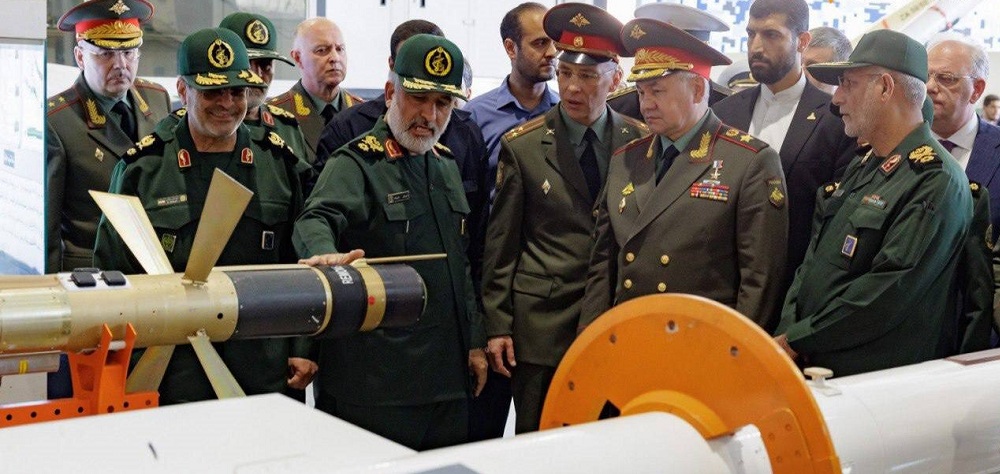The visit by Shoigu and his delegation to Tehran is the first in a decade and therefore can be seen of importance in terms of agenda and outcomes. What are its effects on the military cooperation between the two countries in the future?
Generally speaking, it seems that the Iranian and Russian officials find the visit marking a significant step in enhancing their military relations.
Russian Defense Ministry said that the visit will contribute to deeper military ties with Tehran, adding that it will commence an important stage in developing their cooperation.
Russian representative to the international organizations in Vienna Mikhail Ulyanov posted a video on X, formerly Twitter, showing the warm reception of the Shoigu by Chief of General Staff of Iranian Armed Forces General Mohammad Bagheri
“Iran is our neighbor and partner. Dialogue, including between military officials, is necessary,” the caption for the video read.
In the meeting, General Bagheri in line with the positions of the Russian officials announced the decision of the leaders of the two countries to put the relations on the path of further growth and development, and voiced his contentment about the new dimensions in partnership that have been created over time with the Russian Federation.
His emphasis on formation of new military relations between the two countries over time can majorly be associated with the regional and international developments over the past decade that allowed Tehran and Moscow to move to an unwritten alliance meeting their geopolitical interests, and certainly the face of this alliance was confrontation of the Arab-Western plots against Syrian government.
Syrian crisis the turning point in Tehran-Moscow military cooperation
Iran and Russia formed a new and unprecedented strategic alliance after eruption of the Syrian crisis in 2011. In addition to the successful cooperation between the two countries in the fight against the spread of Takfiri terrorism in Syria, which with the support of the West was growing in the security geography of the region like a cancerous tumor, the two countries warded off an American-led Western plot to initiate a domino of developments starting with Syria crisis to change the power calculus in West Asia with the core aim of challenging the power of the West’s two main regional and international rivals Russia and Iran.
As part of the alliance, for the first time, Iran, Russia, Syria and Iraq established a joint intelligence command center in Baghdad in 2015 to coordinate their separate operations against the ISIS terrorist caliphate, which at the time had seized one-thirds of Iraq and Syria territory.
This military and intelligence cooperation grew next years, and in 2016, Iran allowed Russian strategic bombers to land in its air base in the northwestern province of Hamedan to strike ISIS in Syria from a shorter range.
But victory over an international destabilizing front in Syria did not stop the fast pace of the Russian-Iranian military and political closeness. Actually, Putin-led Russia for the first time after collapse of the Soviet Union grew interested in restoring its historical influence in West Asia and North Africa, and this required maintaining a close relationship with Tehran as a powerful and influential ally in the competition against the West.
Between 2000 and 2006, Tehran made only two major purchases from Russia including defense systems and SU-25 aircraft, and even Moscow postponed the delivery of the S-300 air defense system to Iran until 2017 due to Western sanctions. But after the Syrian crisis, the equations totally changed, and between 2010 and 2023, Russia and Iran conducted 9 joint military exercises, mostly to directed against terrorism, piracy, as well training for search and rescue missions.
Also, since 2019, Iran, Russia and China started a schedule for annual naval exercises in the Indian Ocean or near the Gulf of Oman, signaling a growing military alliance of Eastern powers with the Islamic Republic in West Asian region and a strategic cooperation with Tehran on important geopolitical cases in continuation of economic partnership.
Military cooperation in strategic relations
Though Syria-topped regional crises initiated a new age in the historical Russian-Iranian relationship based on security and military cooperation, Ukraine crisis and massive Western sanctions against Moscow transformed Kremlin leaders’ view to development of relations with the allies to mitigate the economic pressures and escape international isolation. Meanwhile, Iran, which is itself under Western sanctions and therefore is not afraid of the cooperation with Russia and at the same time is the bridge between Russia and the Persian Gulf and warn oceanic waters, came under Russian focus.
During Russian defense minister’s visit, General Bagheri broke the news about composing a document for long-term Iranian-Russian cooperation. According to him, this document is of strong defense and military aspects and can provide a proper ground for developing long-term cooperation between Tehran and Moscow.
Though the West with its media uproar is seeking to link the tendency of the two countries to engage in broader military cooperation to Ukraine developments and even wished to extend the anti-Iranian UN Security Council arms sanctions under this pretext, just contrary to the Western claims the end of sanctions on imports of conventional weapons in 2020 not only created an Iranian thirst for Russian arms, but also Iran’s defense self-sufficiency showed that Tehran is seeking revenues from its modern weapons like drones, ballistic missiles, and air defenses.
However, it seems that the long-term cooperation document between the two countries is partly driven by a will of the Iranian armed forces to use or participate in production of some of advanced Russian technologies and weapons like fighter jets and attack helicopters./129

